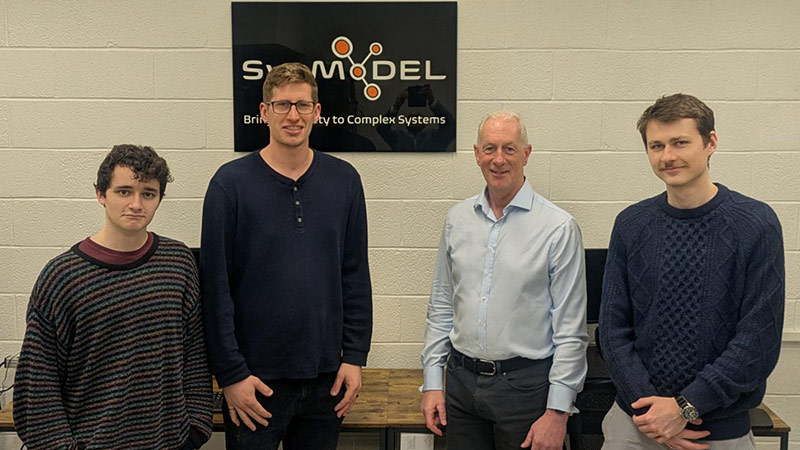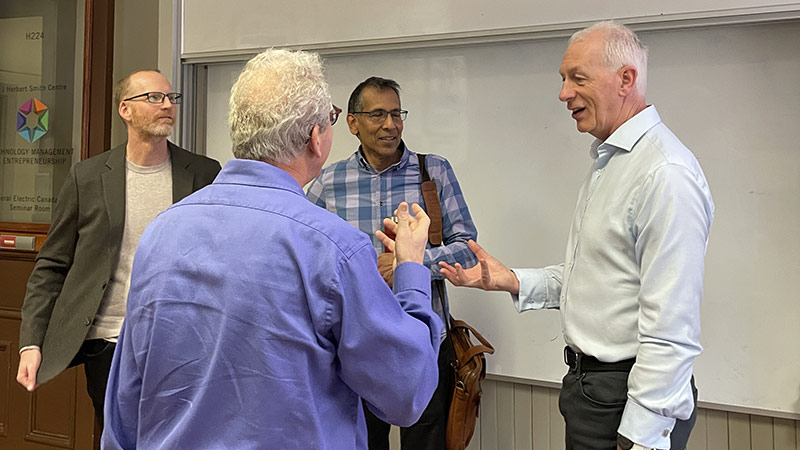Exploring renewable energy innovation: Professor John Ringwood visits UNB Engineering
Author: UNB Engineering
Posted on May 13, 2025
Category: News & Events

The University of New Brunswick recently welcomed Professor John Ringwood, a global leader in marine renewable energy research and Professor of Electronic Engineering at Maynooth University, Ireland.
His visit, which included a distinguished research seminar and participation in the UNB Engineering Design Symposium, marked a milestone in a growing connection between UNB and international leaders in wave energy innovation.
Professor Ringwood is Chair Professor of Electronic Engineering and Director of the Centre for Ocean Energy Research (COER) at Maynooth. He is also an IEEE Fellow, a Chartered Engineer, and a Fellow of Engineers Ireland.
With a research career spanning control systems, renewable energy, and wave energy in particular, Ringwood has authored numerous scholarly works, including the monograph Hydrodynamic Control of Wave Energy Devices. His visit to UNB was an opportunity to deepen academic ties and explore new avenues for collaborative research.
As part of his time on campus, Ringwood delivered a seminar titled Control Co-Design for Wave Energy Systems, which provided students and faculty with a technical overview of an emerging systems design approach in renewable energy. Control co-design (CCD), as he explained, focuses on the simultaneous design of both a system’s physical components and its control systems to optimize energy extraction.
“In wave energy systems, control and design are deeply interconnected,” Ringwood said during his lecture. “You can’t optimize one without the other. CCD offers a holistic view of design—whether you’re looking at hull geometry, moorings, or the control software that drives it all.”
Ringwood also addressed the computational challenges of CCD and emphasized the importance of mathematical modeling and performance objectives tailored to wave energy. The talk attracted students and researchers from several disciplines, reflecting the multidisciplinary nature of the field.
Outside the lecture hall, Ringwood connected with students and faculty across UNB Engineering. He served as a judge at the 2025 UNB Engineering Design Symposium and was impressed by what he called the faculty’s “strong entrepreneurial culture.”
“There’s a very strong culture here, which was instigated by J. Herbert Smith quite a few years ago on the entrepreneurial side,” Ringwood said. “I see it in a lot of the students. People make things, do things, and bring them to the commercial world—and that’s fantastic.”

Despite his background in control systems and electronic engineering, Ringwood enjoyed stepping outside his comfort zone to judge mechanical engineering projects.
“I love the breadth of things,” he said. “I learned a huge amount myself. That’s one of the joys of visiting different universities—you get exposed to new ideas and ways of thinking.”
His own entry into wave energy research was similarly serendipitous. “In 2001, a guy came through the door and said he was interested in doing a PhD,” Ringwood recalled.
“He came back two weeks later and said there’s a guy down the road looking for a control system for a wave energy device. And I said, ‘What’s a wave energy device?’ That’s how it all started.”
Over the past two decades, Ringwood has built an internationally recognized research centre in wave energy control systems. During his visit, he identified multiple points of connection with UNB’s research strengths—particularly in ocean engineering.
“There are definitely synergies. Kush’s work on multiphysics modeling of ocean engineering systems, for example, has real potential within the wave energy domain,” he said.
Ringwood believes international collaboration is essential in tackling the complex challenges of renewable energy. “The problem is bigger than any one organization,” he said. “We need to team together to sort out the fundamentals.”
He also encouraged students from all disciplines to consider contributing to the future of renewable energy. “Social acceptability is a huge part of getting projects off the ground,” he said. “It’s not just about the technical side.”
Reflecting on his time in Fredericton, Ringwood expressed sincere gratitude. “I would like to thank the team at UNB for making my visit a fantastic experience,” he said.
“Everyone was incredibly welcoming, and I learned so much from the people I met. I’m very excited to solidify a partnership with UNB and look forward to working together on marine renewable energy research.”
